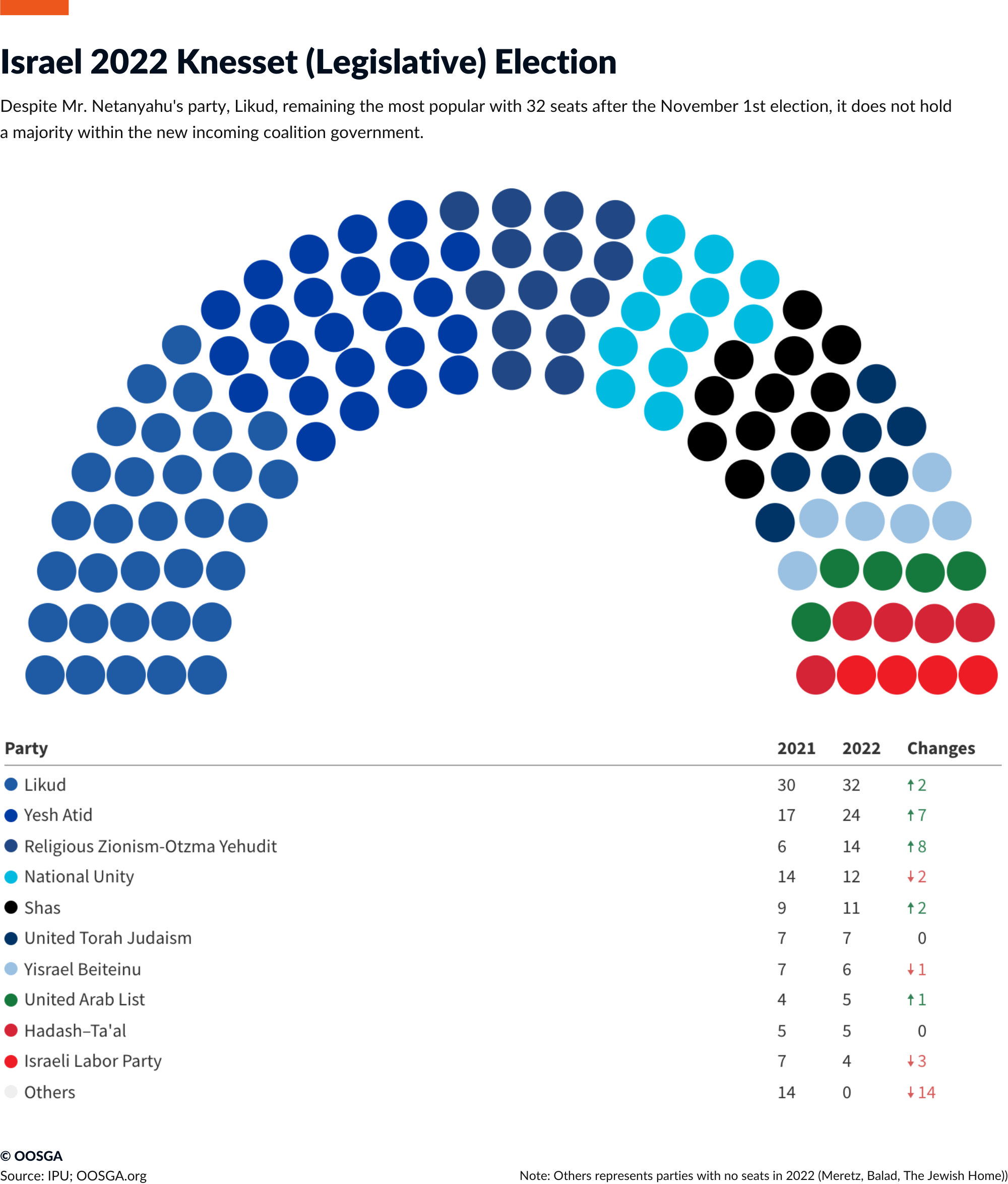Connect With Authors
*Your message will be sent straight to the team/individual responsible for the article.
Israel is a parliamentary democracy that was established in 1948 and has successfully industrialized over the years. The country experienced a hyper-inflationary crisis in the mid-1980s, which led to the adoption of a market-driven economy. Since the 1990s, the technology sector has grown rapidly, and Israel has absorbed multiple waves of mass immigration up until the late 1990s. The peace process between Israel and Palestine has been stagnant for years, with Israel occupying territories claimed by Palestine. Shared concerns about Iran and economic opportunities allowed Israel to normalize ties with several Arab states in 2020, which was historical and critical for the stability in the region.
Israel’s political structure is based on a parliamentary system of representative government, with a 120-seat unicameral parliament called the Knesset. The president is the formal head of state, but his powers are mostly ceremonial. The Knesset is elected at least once every four years under a system of proportional representation, and the leader of the party most likely to assemble a majority in the Knesset is called upon by the president to form a government. Governments have always ruled in coalition and rarely complete their terms.
Security issues, primarily Iran’s ambitions, remain a priority for Israel. The unresolved Israeli-Palestinian conflict is also a significant concern. Although the government has made progress in liberalizing the economy, economic inequalities and the high cost of living remain a source of popular concern. To address these disparities, the government plans to implement market liberalization and provide targeted support to some communities. Religious-secular issues are likely to remain a divisive topic, with reforms expected to stall.
The immediate priority for the new government of Israel will be to obtain legislative approval for the 2023 budget, which will require significant adjustments to accommodate changes in the economic cycle and politically motivated tax and spending changes. However, there are some areas of consensus with previous governments in terms of maintaining fiscal spending at manageable levels. In the short term, the high cost of living will be the top policy issue due to global inflationary pressures, with measures such as market liberalization, reduced import tariffs, tax credits, and social support for targeted groups being key to government efforts. In the longer term, infrastructure, renewable energy, and transport will be policy priorities, with labor market reform being a significant long-term goal, but with only partial success expected in the medium term. Despite some pushback from elements of the new government, pro-business policies, including monetary policy independence, free trade, and open capital markets, will be broadly maintained under successive governments, but social welfare considerations will gain slightly more prominence, potentially limiting tax cuts and exemptions in some sectors.
18.01 Billion
3.4 %
0.6 %
60.7 %
The final vote count of the election in Israel showed that Likud leader Benjamin Netanyahu and his right-wing allies have won a decisive majority. Likud won 32 seats, followed by Yesh Atid with 24 seats, and the far-right Religious Zionism with 14 seats. Netanyahu’s likely coalition partners, Shas and United Torah Judaism, won 11 and seven seats, respectively. The National Unity won 12 seats, while the Arab-majority parties, Hadash-Ta’al and United Arab List, each have five seats. Labor is just over the electoral threshold with four seats. The outgoing Prime Minister Yair Lapid called Netanyahu to congratulate him on his victory, stating that he is ready for an orderly transition of power.
The multi-party political system in Israel makes it difficult to form and maintain stable coalitions. Despite being the most popular party with 32 seats, Mr. Netanyahu’s Likud does not have a majority in the new coalition government, which is expected to be fractious and short-lived. Frequent elections are likely to continue, and Mr. Netanyahu’s corruption trial is ongoing, with the possibility of him seeking immunity from prosecution. Right-wing governments are likely to dominate in the future due to the electorate’s right-leaning tendencies.

-
37
-
29
9.02 $
39.68 $
3560 $
2.435 %